In this week’s review of Court Judgments, we look at the Supreme Court’s observation regarding the mother’s right to decide on the surname of the child and the apex court’s observation regarding the criteria to decide the custody of a child. We also look at the Delhi High Court’s consideration of delay in filing an appeal in a POSH Act case, Allahabad High Court’s decision upholding the will of a minor child and Karnataka High court’s directions for compensation relating to wrongful arrest.
Supreme Court: Mother can give the surname of the second husband to the child after the death of the biological father.
The Supreme Court bench comprising of Justice Dinesh Maheshwari & Justice Krishna Murari observed that a mother who has remarried after the death of her earlier husband can decide the surname of the child and include her in her new family. In the case, Akella Lalita vs. Sri Konda Hanumantha Rao, Supreme Court has set aside an earlier judgment by the Andhra Pradesh High Court.
As per the case details, the dispute was between the mother of the child, who has remarried and the parents of her deceased husband, who is the biological father of the child. The contention was about the surname that needs to be given to the child. The mother approached Supreme Court challenging the judgment by the Andhra Pradesh High Court.
The AP High Court in its judgement had directed the mother to change the surname of the child and also to show the name of her new husband in records only as ‘stepfather’. The High-count directed that wherever the records permit, the name of the natural father shall be shown.
The case in the Supreme Court raised two issues:
- Whether the mother, who is the only natural guardian can decide on the surname of the child and give the surname of the husband who she remarries.
- Whether the High Court has the power to direct the appellant (mother) to change the surname of the child, especially since this was not sought by the respondents (parents of the deceased husband) in their petition.

The Supreme Court bench referred to the case of Githa Hariharan & Ors vs. Reserve Bank of India & Ors, wherein the mother was elevated to an equal position as a father thereby improving her right as a natural guardian of the child under Section 6 of Hindu Minority and Adoption Act, 1956.
Regarding the surname, the bench observed that surname is not only indicative of lineage but also plays a role in the social reality and creating a sense of being for children in a particular environment. Homogeneity of surname helps to create, sustain, and display the notion of family.
It noted that the direction of the High Court to include the name of the present husband as step-father in documents is almost cruel and is mindless of how it would impact the mental health and self-esteem of the child. Since the child would now be part of the adoptive family it is logical that he takes the surname of the adoptive family.
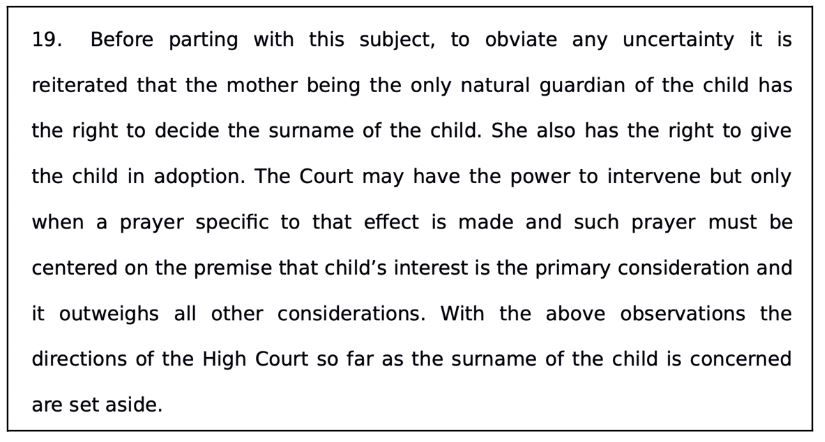
Delhi High Court: Delay in filing appeal u/s 18 of POSH act can be condoned
In the case DB Corp ltd vs. Shailja Naqvi & Ors, Delhi High Court observed that under the Sexual Harassment of Women at Workplace (Prevention, Prohibition and Redressal) Act, 2013 i.e. POSH Act, a victim’s delay in filing an appeal against the inquiry report can be accepted if such a delay is explained.
Per the case details, the first respondent accused the second respondent of having sexually harassed her at the workplace. The complaint was referred to an internal complaints committee of the company. Through the inquiry report dated 24 May 2016, the second respondent was exonerated. An appeal was filed against the report under Section 18 of the POSH Act to the Central Government Industrial Tribunal. The Industrial Tribunal condoned the delay of 36 days in filing the appeal. This was challenged by the petitioner company, which was aggrieved by the order of the tribunal court.
The question raised in the High court was whether the Industrial tribunal could condone the delay in filing the appeal under Section 18 of the Sexual Harassment at Workplace Act, as there is no provision for condonation of delay. The Delhi High Court bench comprising Justice C Hari Shankar agreed with the observation made by the Industrial Tribunal and stated that a victim of sexual harassment remains in a state of trauma, and it cannot be expected that she would immediately approach a court to seek appellate remedies.
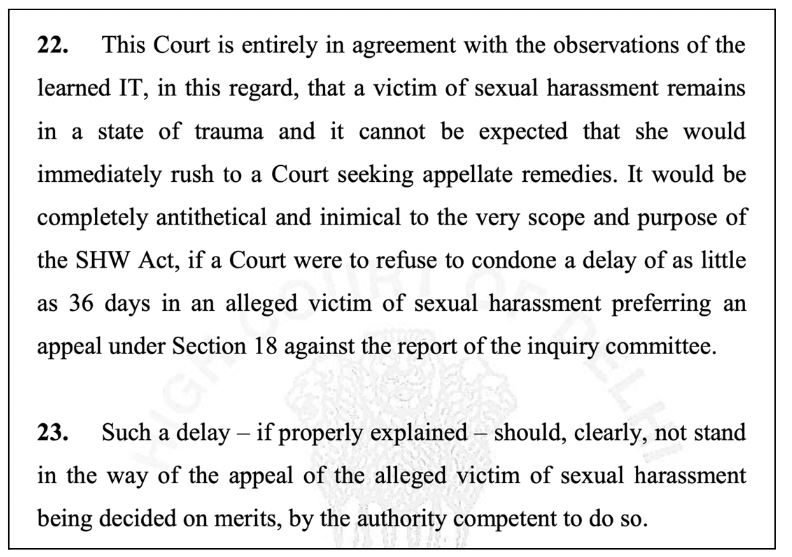
Allahabad High Court: Can’t detain minor in protection homes against her wishes
Allahabad High Court bench comprising of Justice Sanjay Kumar Singh observed that even the parents cannot compel detention of a minor against her will unless there is some other reason for it. The court made this observation in case X(Minor) and Another vs. the State Of U.P. and 2 Others and granted the custody of the minor to her mother after ascertaining the minor’s wishes.
As far as the case is concerned, the mother of the minor victim lodged an FIR under Section 363 and 366 IPC relating to her missing daughter. The victim was recovered from the Railway station in Kasganj and was produced before the Child Welfare Committee, Kasganj. In the statement, the minor expressed her desire to go with her mother and also refused medical examination.
However, the Child Welfare Committee did not give custody of the victim to her mother but sent her to Rajkiya Balika Grih. The mother moved an instant revision plea challenging the order passed by Child Welfare Committee, Kasganj.
The victim expressed her desire to go with her mother, even to the High Court. Since the mother was also willing to take custody, the pending question before the court was whether a victim can be kept in a protective home against her wishes.
The court reviewed multiple earlier judgments and observed that while the welfare and care of the child is the legal responsibility of the child welfare authority, credence must also be given to the wishes of the child.
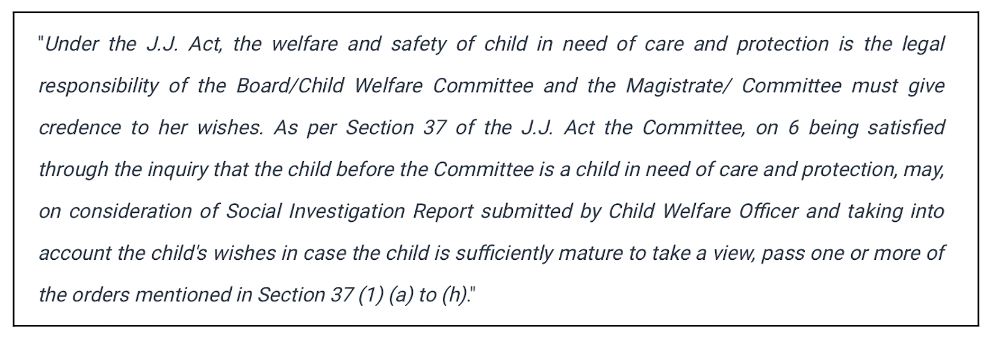
Based on the statements made by the victim and her mother, the court directed to handover of the custody of the victim to the mother and set aside the order passed by Child Welfare Committee.
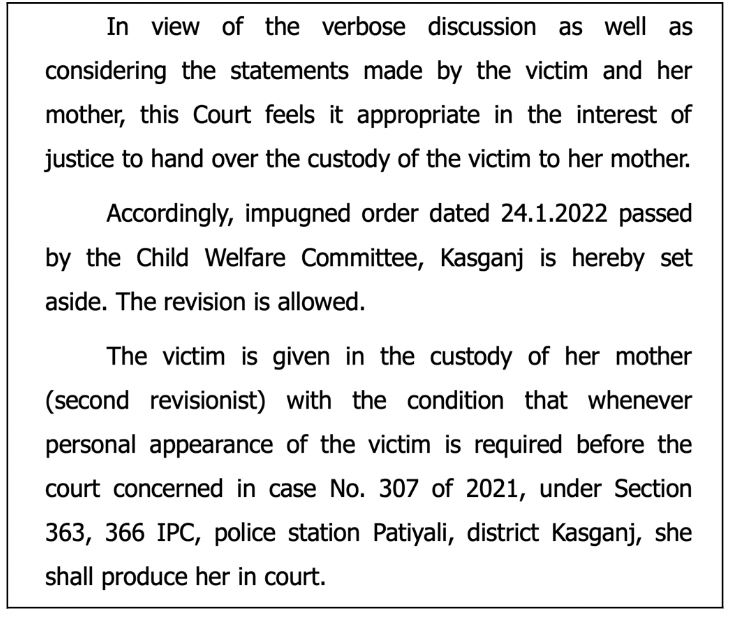
Supreme Court: Wish or Desire of a Child is different from the Best Interest of Child
The Supreme Court observed a difference between the question of ‘What is the wish/desire of the child’ and ‘what would be the best interest of the child’. This observation was made by a Supreme Court bench comprising Justices AM Khanwilkar & CT Ravi Kumar in the case, Rohith Thammana Gowda vs. State of Karnataka.
An appeal was filed by a father whose habeas corpus petition was earlier dismissed by the Karnataka High Court. In the high court, the father contended that the child is in unlawful custody of the mother, and she is continuing to hold the custody of the child against the orders issued in the US courts to return the child to USA.
The High court, based on the interaction with the child noticed that the child expressed the desire to stay with his mother. Hence, the high court held that the child is not in the unlawful custody of the mother.
Looking into the appeal, Supreme Court observed that there needs to be a distinction between the desire of the child and what is best for the child. The court needs to look beyond the allegations made against each other by the couple as they are at loggerheads and as the allegations are aimed to depict the other parent as unworthy of having custody of the child. Therefore, the court needs to consider what would be in the best interest of the child.
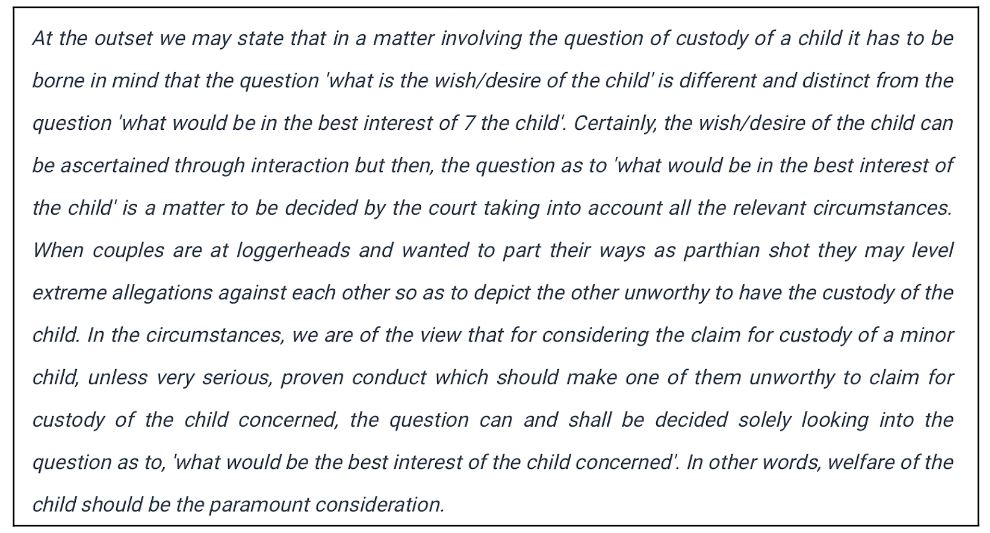
The Supreme Court stated that the Karnataka High Court ought to have acknowledged the orders of the US Court which directed the return of the minor child to its father in view of the best interests of the child. As such, the welfare of the child would be for the return to his native country i.e., the USA. The child is a naturalised American citizen and has an American passport. He was brought up with the social and cultural values of the USA and is more accustomed to them. Further, there would be better prospects if he returns to the USA. In view of this, the Supreme Court allowed the appeal and issued various directions regarding the custody and visitation rights.
Karnataka HC: Orders compensation of Rs. 5 lakhs to a man wrongly arrested
In the case Ningaraju N vs. Official Liquidator of M/S India Holiday Pvt. Ltd, the Karnataka High Court directed the state government to pay a compensation of Rs. 5 lakhs to Ningaraju N, for being wrongly arrested based on alleged confusion in identity. Further, the single judge bench of Justice Suraj Govindaraj has held that whenever any warrant is issued, the arresting officer is required to ascertain the identity and be assured of the person being arrested is the same one against whom the warrant is issued.
As per the details presented in the case, the only reason why the person was arrested was that the name of the father of the person arrested was the same as the name of the father of the person against whom the warrant was issued. The court expressed its failure to comprehend, how the name of the father might have influenced the wrongful arrest. It was observed that the arrestee stated that he was not the person named in the warrant, but the arresting officer has not verified and presented him in court. This is in violation of the fundamental rights guaranteed under Article 21 of the constitution.
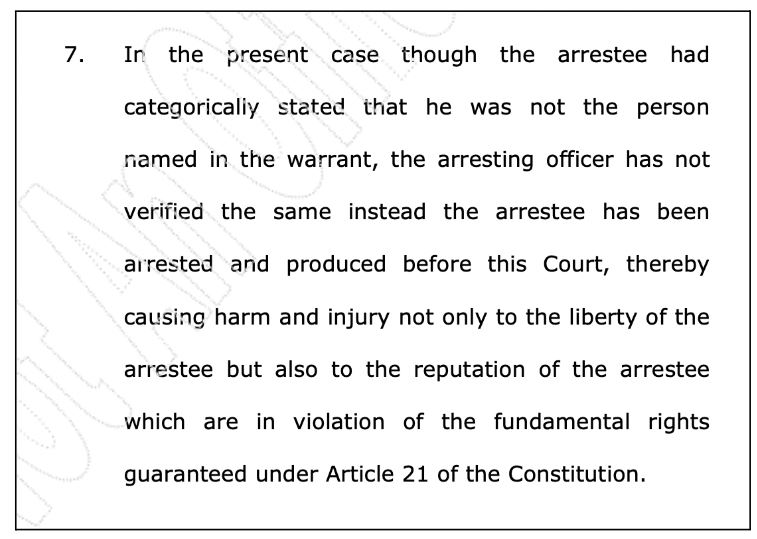
It directed the State to pay a compensation of Rs. 5 Lakhs within 8 weeks. It also directed the Director General of Police to issue guidelines or Standard Operating Procedure, if not already issued, regarding the steps to be taken by the arresting officer before arresting a person.
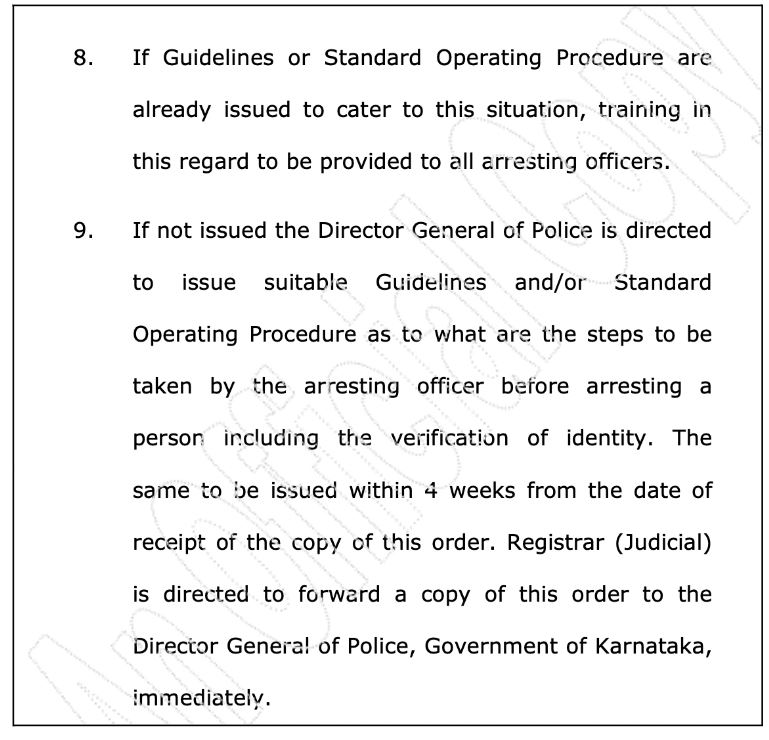
Featured Image: Review of Court Judgments


